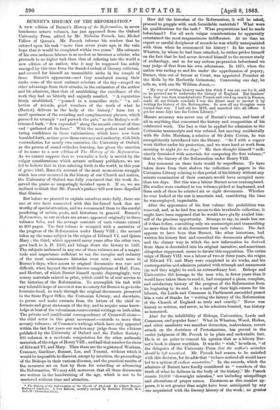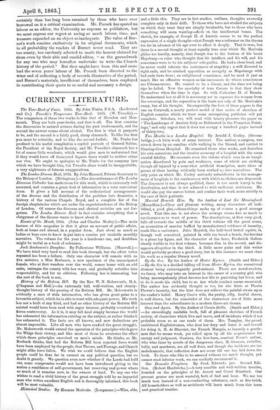BURNET'S HISTORY OF THE REFORMATION.*
A NEW edition of Burnet's History of the Reformation, in seven handsome octavo volumes, has just appeared from the Oxford University Press, edited by Mr. Nicholas Pocock, late Michel Fellow of Queen's. Mr. Pocock informs his readers that he entered upon his task " more than seven years ago, in the vain hope that it would be completed within two years." His estimate of his own arduous labours is as modest as becomes a scholar, who pretends to no higher task than that of ushering into the world a new edition of an author, who it may be supposed has safely emerged by this time from the dreaded ordeal of literary criticism, and secured for himself an unassailable niche in the temple of fame. Brunet's opponents—and they numbered among their ranks some of the most eminent scholars of the day—reaped no other advantage from their attacks, in the estimation of the author and his admirers, than that of establishing the excellence of the work they had so bitterly and unjustly assailed. " A reputation firmly established," "penned in a masculine style," "a col- lection of records, good vouchers of the truth of what he (Burnet) delivers in the body of the history," form but a small specimen of the sounding and complimentary phrases, which pursued its triumph " and partook the gale," as the Bishop's well- trimmed bark, " flew expanded " along the smooth current of time and " gathered all its fame." With the most perfect and unhesi- tating confidence in these vaticinations, which have now been heralded forth, as time gave them currency and authority, with little contradiction for nearly two centuries, the University of Oxford, as the patron of sound orthodox learning, has given the sanction of its name to a new edition of The History of the Reformation. As we cannot suppose that so venerable a body is moved by the vulgar considerations which actuate ordinary publishers, we are led to believe that in thus ushering forth to the world, in this year of grace 1865, Burnet's account of the most momentous struggle which has ever occurred in the history of our Church and nation, the University of Oxford was fully convinced that the work de- served the praise so unsparingly lavished upon it. If so, we are inclined to think that Mr. Pocock's preface will now have dispelled that illusion.
But before we proceed to explain ourselves more fully, there are one or two facts connected with this far-famed book that are worthy of special attention, and we recommend them to the careful pondering of artists, poets, and historians in general. Burnet's Reformation, as our readers are aware, appeared originally in three volumes folio, and the average contents of each volume extend to 800 pages. The first volume is occupied with a narrative of the progress of the Reformation under Henry VIII. ; the second takes up the same subject in the reigns of Edward VI. and Queen Mary ; the third, which appeared many years after the other two, goes back to A. D. 1300, and brings down the history to 1567. The subjects embraced in any one of these volumes are of a magni- tude and importance sufficient to tax the energies and industry of the most consummate historian even now ; much more in Burnet's days, when access to original documents was rare and difficult, when beyond the well-known compilations of Hall, Foxe, and Herbert, of which Burnet himself speaks disparagingly, very scanty materials existed in print, which could be of real service to the historian of the Reformation. To accomplish his task with any tolerable hope of success it was necessary for Burnet to go to the fountain-head, to wade through the original documents preserved in the State Paper Office, the Cottonian Library, and elsewhere, to peruse and make extracts from the letters of the chief re- formers and great statesmen of the day, and to acquire some know- ledge at least of the voluminous controversial writings on both sides. The private and confidential correspondence of Cromwell alone—
the chief actor in this great movement—extends to more than seventy volumes; of Cranmer's writings which have only appeared within the last few years our readers may judge from the editions published by the University of Oxford and the Parker Society ; 400 volumes is a moderate computation for the other authentic materials of the reign of Henry VIII., and half that number for those of Edward VI. and Mary. Then there are the registers of Warham, Cramer, Gardiner, Bonner, Lee, and Tunstal, without which it would be impossible to discover, except by intuition, the proceedings of the Bishops in their various dioceses, and the practical results of the measures set on foot by them for retarding or advancing the Reformation. We may add, moreover, that all these documents are written in the handwriting of the age, which is not to be mastered without time and attention.
" The History of the Reformation of the Church of Engand. Br Gilbert Burnet, Bishop of Salisbury. A New Edition, carefory revised by Nicholas Pocock, M.A. Gat.rd: Clarendon Press. How did the historian of the Reformation, it will be asked, proceed to grapple with such formidable materials ? What were his qualifications for the task ? What preparations had he made beforehand? For all such vulgar considerations he apparently entertained the moat magnanimous indifference. At no time an expert or careful decipherer of records he was wholly unacquainted with them when he commenced his history ! In his answer to Wharton, by whom he had been attacked, he rather prides himself on the fact that he had never devoted himself to the meaner study of archaeology, and as for any serious preparation beforehand we may judge of that from his own admissions. In 1675, when the nation was reeling to and fro under the apprehension of popery, Burnet, then out of favour at Court, was appointed Preacher at the Rolls by Sir Harbottle Grimstone. Conversing one day, he tells us, with one Sir William Jones,- " My way of writing history made him think I was cut out for it, and so he pressed. me to undertake the history of England. But Sanders' book, that was then translated into French and cried up much in France, made all my friends conclude I was the fittest man to answer it by writing the history of the Reformation. So now all my thoughts were turned that way. I laid out for MSS. and searched into all offices. I. got for some days into the Cotton Library."
Minute accuracy was never one of Burnet's virtues, and least of all in anything that concerned the history and composition of his celebrated work. The fact is that he applied for admission to the Cottonian manuscripts and was refused, but meeting accidentally with Sir John Marsham, a relative of Sir John Cotton, he was surreptitiously introduced into the library. " So I with a copyer went thither under his protection, and we were hard at work from morning to night for ten days." He then thought himself " suffi- ciently furnished with materials for composing the first volume;” that is, the history of the Reformation under Henry VIII.
Any comment on these facts would be superfluous. To have taken down from their shelves the collection of papers in the Cottonian Library relating to this period of his history without any minute examination of their contents would have occupied more than ten days. But this was a labour Burnet never contemplated. His studies were confined to ten volumes picked at haphazard, and_ from each of these he selected six or eight documents. Whether he ever looked at the rest is uncertain and, considering the time he was employed, improbable.
After the appearance of his first volume the prohibition was removed, and, as he had free access to this invaluable collection, it might have been supposed that he would have gladly availed him- self of the precious opportunity. Strange to say, he made less use of it than before, consulting only six manuscripts and transcribing no more than five or six documents from each volume. The fact appears to have been that. Burnet, like other historians, had written his history first and consulted the documents afterwards, and the clumsy way in which the new information he derived from them is dovetailed into his original narrative, and sometimes altogether suppressed, seems to favour this supposition. The entire reign of Henry VIII. was a labour of two or three years, the reigns of Edward VI. and Mary were Completed in six weeks, and his contemporaries and admirers pointed with triumph and amazement (as well they might) to such an extraordinary feat. Bishops and Universities did homage to the man who, in fewer years than it would have taken them to read it, had composed a pious, complete, and satisfactory history of the progress of the Reformation from its beginning to its end. As a mark of their high esteem for his labours, the Lords and Commons in Parliament assembled passed him a vote of thanks for " writing the history of the Reformation of the Church of England so truly and exactly." Never was history so written, and never, as his admirers boasted, was history
so honoured.
Alas! for the infallibility of Bishops, Universities, Lords and Commons, and popular fame ! What in Wharton, Wood, Hickes, and other assailants was manifest detraction, malevolence, covert attack on the doctrines of Protestantism, has proved in the cooler, judgment of Mr. Pocock to be plain and undeniable fact. He is at no pains to conceal his opinion that as a history Bur- net's book is almost worthless. It was the " wish," he tells us, " of the delegates of the University Press that the author's mistakes should be left unnoticed. Mr. Pocock had reason to be satisfied with this decision, for he adds that "to have noticed all would have led to a system of endless annotation." In the records, which the admirers of Burnet have fondly considered as " vouchers of the truth of what he delivers in the body of the history," Mr. Pocock counts 10,000 "downright mistakes," not including misspellings and alterations of proper names. Enormous as this number ap- pears, it is not greater than might have been anticipated by any one acquainted with the literary history of the work ; no greater certainly than has long been surmised by those who have ever bestowed on it a critical examination. Mr. Pocock has spared no labour as an editor, the University no expense as publishers, but we must express our regret at seeing so much labour, time, and treasure expended on an object so inadequate. The value of Bur- net's work consists exclusively in its original documents, which in all probability the readers of Burnet never read. They are too scanty, too carelessly selected to merit the honour claimed for them even by their able and candid editor, " as the groundwork for any one who may hereafter undertake to write the Church history of the period." But they might have been this and more had the seven years' labour of Mr. Pocock been directed to the wiser end of collecting a body of records illustrative of the period, and Burnet's materials, insufficient of themselves, been employed in contributing their quota to so useful and necessary a design.































 Previous page
Previous page